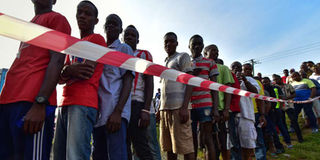Liberian parties file election appeal at the Supreme Court

People wait in line prior to casting their vote for Liberia's presidential and legislatives elections, at a polling station in Monrovia on October 10, 2017. The parties of presidential candidates who finished second and third have filed election appeals at the Supreme Court, saying that the "fraud and gross irregularities throughout the electoral process warrant a re-run of the elections". PHOTO | ISSOUF SANOGO | AFP
What you need to know:
- Legal documents filed by the Unity Party and Liberty Party said alleged errors linked to the voter register and ballot paper serial numbers amounted to "the violation of the Constitution and laws of Liberia".
- They added that "the pervasiveness of the fraud and gross irregularities throughout the electoral process warrant a re-run of the elections".
- The Supreme Court put a temporary stay on a run-off, while the National Elections Commission heard the parties' complaints.
- The NEC found the parties' allegations either unfounded or exaggerated and ruled last week it had not carried out a fraudulent election, a decision maintained upon appeal.
MONROVIA
The parties of the Liberian presidential candidates who finished second and third in the October 10 elections have lodged an appeal with the Supreme Court calling for a re-run of the vote.
Incumbent Vice-President Joseph Boakai and veteran opposition leader Charles Brumskine brought the demand to Liberia's highest legal body on Monday after the country's electoral commission ruled that irregularities recorded during voting did not affect the overall result.
FRAUD CLAIMS
Legal documents filed by Boakai's Unity Party and Brumskine's Liberty Party said alleged errors linked to the voter register and ballot paper serial numbers amounted to "the violation of the Constitution and laws of Liberia".
The filing added that "the pervasiveness of the fraud and gross irregularities throughout the electoral process warrant a re-run of the elections" — an unprecedented demand to start the entire process of choosing a new president from scratch.
The men are vying to replace President Ellen Johnson Sirleaf, a Nobel Peace Laureate and Africa's first elected female leader who is stepping down after a constitutional maximum of two six-year terms.
Boakai was due to face the top-placing candidate — former international footballer George Weah — in a runoff round of voting on November 7, but the Supreme Court put a temporary stay on the poll while the National Elections Commission (NEC) heard the parties' complaints.
ELECTION
The NEC found the parties' allegations either unfounded or exaggerated and ruled last week it had not carried out a fraudulent election, a decision maintained upon appeal.
A runoff is held if no single candidate gains more than 50 per cent of votes in the first round, and Weah won 38.4 per cent to Boakai's 28.8 per cent.
The electoral commission now has until Monday, December 4, to file necessary records with the court, which then has a week to rule whether to go ahead with the Weah-Boakai runoff or to hold fresh elections.
Battered by back-to-back civil wars between 1989 and 2003 and an Ebola crisis that killed thousands from 2014 to 2016, the election is considered a crucial test of the west African nation's stability.





